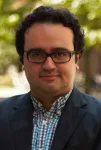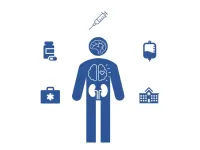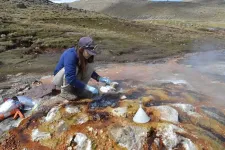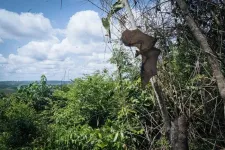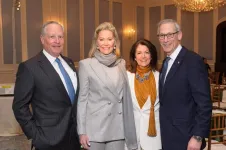Established in 2013, the Sage-CASBS Award recognizes outstanding achievement in the behavioral and social sciences that advances our understanding of pressing social issues. It underscores the role of the social and behavioral sciences in enriching and enhancing public discourse and good governance. Past winners of the award include Daniel Kahneman, psychologist and Nobel laureate in economic sciences; Pedro Noguera, sociologist and education rights activist; Kenneth Prewitt, political scientist and former U.S. Census Bureau director; William Julius Wilson, sociologist and celebrated scholar of poverty, inequality, and race; Carol Dweck, social psychologist and foundational figure in the development of mindset science; and Jennifer Richeson, psychologist and authority on the cognitive, affective, and behavioral dynamics of intergroup interactions.
Both Anderson and Nelson will receive the full cash prize that accompanies the award.
“Elizabeth Anderson and Alondra Nelson exemplify everything Sage and CASBS envision for this award – excellence in social and behavioral science scholarship that crosses disciplinary boundaries and advances ideas and discussions not only within the academy, but also in the public sphere,” said Blaise Simqu, CEO of Sage, and Walter “Woody” Powell, the Sara Miller McCune Interim Director of CASBS, in a joint statement. “We are proud to recognize them for their extraordinary efforts to generate new understandings of how we as a society treat one another, and then translate those understandings into practice for the common good.”
Integrating expertise and insights at the intersection of philosophy, economics, history, and other social sciences, Elizabeth Anderson has established herself as one of the deepest and most interdisciplinary thinkers in the academy for more than three decades. Her work has exerted profound impact on various fields, challenged traditional frameworks, advocated for democratic ideals, and promoted social justice. After earning a PhD in philosophy from Harvard University, she joined the faculty of the University of Michigan in 1987, where she now serves as the Arthur F. Thurnau Professor (since 2004), the John Dewey Distinguished University Professor of Philosophy and Women’s Studies (since 2013), and the Max Shaye Professor of Public Philosophy (since 2021).
Anderson specializes in moral, social, and political philosophy; feminist theory; social epistemology; and the philosophy of economics and social sciences. Her work involves examinations of democratic theory, equality in political philosophy and U.S. law, the history of egalitarianism and ethics, value theory and the ethical limits of markets, racial integration and affirmative action, rational choice and social norms, and facts and values in social scientific research. Her books include Value in Ethics and Economics (1993); The Imperative of Integration (2010), winner of the 2011 Joseph B. Gittler Award from the American Philosophical Association; Private Government: How Employers Rule Our Lives (And Why We Don’t Talk About It) (2017); and the forthcoming Hijacked: How Neoliberalism Turned the Work Ethic Against Workers and How Workers Can Take It Back (September 2023).
In addition, Anderson has served on numerous academic journal editorial boards and in several capacities with the American Philosophical Association (APA), including as Chair of its Task Force on Inclusion and Diversity (2013-2019) and as Vice President and President of APA’s Central Division (2013-14, 2014-15). She also designed and served as the inaugural director of the University of Michigan’s Philosophy, Politics, and Economics program. Currently, she serves as a member of the American Academy of Arts and Science’s Commission on Re-Imagining Our Economy.
Anderson’s teaching, research, and body of work have earned multiple awards and accolades, including a MacArthur Foundation Fellowship, better known as the MacArthur “genius award” (2019), and a Progress Medal for scholarship and leadership on making the economy more just from the Society for Progress (2018). She has been awarded fellowships from the John Simon Guggenheim Memorial Foundation (2013) and the American Council of Learned Societies (2013). She has been elected as a Fellow of the American Academy of Arts and Sciences (2008), a Corresponding Fellow of the British Academy (2020), a Member of the American Philosophical Society (2021), and a Member of Sigma Xi, the scientific research honor society (2022). She has received honorary degrees from Swarthmore College (2021) and the Universidad Diego Portales (Chile, 2022). In 2020, Prospect Magazine named Anderson among the world’s top fifty thinkers, crediting her approach of “always confronting the world as it truly is rather than how we would like it to be.”
Anderson and her work have engaged public discourse and debates through appearances, interviews, and profiles in a variety of media. A small sampling includes The Atlantic, The Nation, The New York Times, The Guardian, the Financial Times, Vox, and many public radio programs in the U.S., U.K., and Australia. Notably, awareness of her work’s relevance to pressing societal issues and problems reached a wider audience in 2019 when The New Yorker published a lengthy profile of Anderson as “The Philosopher Redefining Equality.” The article traces, across decades, Anderson’s elaboration of relational or democratic (not simply distributive) equality as the basis for a free society, its implications for the theory and practice of a pluralist egalitarian program, the resulting challenges to dominant models and assumptions in multiple areas of thought, and how these contributions cut through factional debates and help redefine the way contemporary philosophy is done.
“Elizabeth Anderson’s contributions are foundational. They influence our consideration of ethical and moral aspects of justice, democracy, and equality in very tangible ways,” said CASBS interim director Woody Powell. “Her pragmatic approach starts with real issues and problems, identifying ways institutions, policies, and practices create social inequalities that manifest in various dimensions of life and for various societal groups. She explores and formulates correctives that strive for a path for all, not just some, to flourish. Her commitment and what her work represents align fully with fundamental principles we embrace here at CASBS. I’m just thrilled we are acknowledging Elizabeth with this award.”
Employing expertise at the intersection of science, technology, medicine, and social inequality, Alondra Nelson has advanced understandings of how race, gender, and other social categories shape and are shaped by the development and use of scientific knowledge. In so doing, Nelson has distinguished herself both through scholarly accomplishment and public service and engagement of the highest order. Since 2019, Nelson has served on the faculty of the Institute for Advanced Study in Princeton, New Jersey, as the Harold F. Linder Chair and Professor of Social Science. She also is a distinguished senior fellow at the Center for American Progress. Nelson previously held academic appointments in the Department of Sociology and the Institute for Research on Women, Gender, and Sexuality at Columbia University (2009-19); and in the Departments of Sociology and African American Studies at Yale University (2003-09). She completed a PhD in American Studies at New York University in 2003.
Most of Nelson’s work has examined ways in which science and technology intertwine with issues concerning equity, power, and inclusion and their implications for marginalized communities. Her major research contributions are situated at the intersection of racial formation and social citizenship, on the one hand, and emerging scientific and technological phenomena, on the other. Nelson’s books include Body and Soul: The Black Panther Party and the Fight Against Medical Discrimination (2011), winner of several awards and a finalist for the prestigious C. Wright Mills Award; and the widely acclaimed The Social Life of DNA: Race, Reparations, and Reconciliation after the Genome (2016). She co-edited the books Technicolor: Race, Technology, and Everyday Life (2001); and Genetics and the Unsettled Past: The Collision of DNA, Race and History (2012). This groundbreaking work brings together several research traditions: political sociology; racial and ethnic studies; the sociology of science, knowledge and technology; medical sociology; and social and cultural theory. She applies qualitative methodology – principally ethnography, historiography, and ethical inquiry – to the study of how conceptualizations of human difference shape lived experience, social relations, and life chances.
Nelson has earned numerous fellowships, including from the Andrew C. Mellon Foundation (2006-07), the Ford Foundation (2007), the London School of Economics (2007), the Max Planck Institute for the History of Science (Germany, 2011), and the University of Bayreuth (Germany, 2014). Her teaching and research have garnered multiple awards, including the Poorvu Family Award for Distinguished Interdisciplinary Teaching from Yale University (2008), the African American Culture and Philosophy Award from Purdue University (2014), and the Morison Prize in Science, Technology, and Society from the Massachusetts Institute of Technology (2020). She has been elected as a Member of the Sociological Research Association (2017), a Member of the American Academy of Political and Social Science (2018), a Fellow of the Hastings Center (2019), a Member of the American Philosophical Society (2020), a Member of the American Academy of Arts and Sciences (2020), a Member of the National Academy of Medicine (2020), and a Member of the American Association for the Advancement of Science (2021). She has received honorary degrees from CUNY: The City College of New York (2021), Rutgers University (2022), and Northeastern University (2023).
Nelson has combined academic accomplishment with high-profile leadership experience in higher education and other institutions. Notably, in concurrence with her academic appointments, she served as the fourteenth president and CEO of the Social Science Research Council (SSRC) (2017-21), the venerated nonprofit organization allied with both Sage and CASBS in its dedication to advancing research in the social sciences. As the first African American to lead the SSRC, Nelson reinvigorated its programming involving strategic collaborations and partnerships as well as the study of inequalities, democracy, future-focused social research, and emerging media and technologies. Nelson served as the inaugural Dean of Social Science (2014-17) at Columbia University, where she guided strategic planning and established new programs and initiatives in the areas of civil and political rights, precision medicine and society, racial equity, the arts and justice, and Turkish studies.
In other leadership roles at Columbia, Nelson served as interim director of the Institute for Social and Economic Research and Policy (2015-16), director of the Institute for Research on Women and Gender (2013-14), founding co-director of the Collaborative to Advance Equity through Research, and founding co-chair of both the Precision Medicine and Society Initiative (2015-19) and the Women’s, Gender and Sexuality Studies Council (2013-17). She has served on the board of directors of the Data and Society Research Institute, the Center for Research Libraries, The Teagle Foundation, the Russell Sage Foundation, the American Association for the Advancement of Science; and on the board of trustees of The American Assembly, the United States International University Africa (Kenya), and the Andrew W. Mellon Foundation. She has been a member of the advisory board of Columbia World Projects; the Center for Global Knowledge Studies at Cambridge University; as well as the Obama Presidency Oral History Project. Nelson was president-elect of the international Society for Social Studies of Science (4S) and chair of the American Sociological Association’s Section on Science, Knowledge, and Technology. She co-chaired the National Academy of Medicine’s Committee on Emerging Science, Technology, and Innovation.
Nelson brought intellect and administrative leadership experience into public service as few social scientists have upon her January 2021 appointment by President Joe Biden as deputy director of the White House Office of Science and Technology Policy (OSTP). Her selection reflected a new commitment to focus a critical equality, civil rights, and ethics lens on science and technology policy. In February 2022, Nelson ascended to the role of OSTP acting director and deputy assistant to the president, whereupon she became the first African American and first woman of color to lead U.S. science and technology policy. Among other accomplishments, she helped lead efforts on federally funded research accessibility, scientific integrity, and on a bill of rights for protecting privacy, enhancing transparency, and promoting equity in the use of artificial intelligence technologies. Shortly before her exit from government service in February 2023, Nature selected Nelson as one of the ten people who helped shape science in 2022. Currently, she is working on a book about science and technology policy in the Obama and Biden Administrations.
Before and since her federal government service, Nelson has been a regular contributor to national policy discussions on inequality and the social implications of new technologies, including artificial intelligence, big data, and genomics. Her thought pieces, essays, and interviews have appeared in The New York Times, The Washington Post, The Wall Street Journal, Nature, Le Nouvel Observateur, the Chronicle of Higher Education, and on National Public Radio, BBC Radio, the New Yorker Radio Hour, and the PBS Newshour, among other venues.
“Alondra Nelson sets new standards through probing social science scholarship that centers equity in science, technology, the public, and policy. She has done a service to society and to social science by firming up connections between both,” continued Sage CEO Blaise Simqu. “Supporting the work of social and behavioral scientists like Alondra Nelson and Elizabeth Anderson inspired our founding at Sage and continues to drive our work nearly 60 years later. It is truly an honor to be celebrating their work today.”
CASBS and Sage disseminated a public call for award nominations in fall 2022. Anderson and Nelson were chosen from a large pool of nominated candidates after a thorough and rigorous selection process. The SAGE-CASBS Award selection committee consisted of Woody Powell; Blaise Simqu; Robert Gibbons, the Sloan Distinguished Professor of Management and Professor of Organizational Economics, Massachusetts Institute of Technology, and a two-time CASBS fellow; Anna Grzymala-Busse, the Michelle and Kevin Douglas Professor of International Studies and Senior Fellow at the Freeman Spogli Institute for International Studies, Stanford University, and former CASBS fellow; and Jennifer Richeson, the Philip R. Allen Professor of Psychology, Yale University, former CASBS fellow, and previous winner of the SAGE-CASBS Award.
In addition to a cash prize, Anderson and Nelson will participate in an in-person award event on Thursday, November 16, 2023, at CASBS. The event will be free and open to the public with registration. The event also will be livestreamed. CASBS will announce event details earlier in fall 2023.
# # #
About Sage
Sage is a global academic publisher of books, journals, and library resources with a growing range of technologies to enable discovery, access, and engagement. Believing that research and education are critical in shaping society, 24-year-old Sara Miller McCune founded Sage in 1965. Today, we are controlled by a group of trustees charged with maintaining our independence and mission indefinitely.
Our guaranteed independence means we’re free to:
Do more – supporting an equitable academic future, furthering disciplines that drive social change, and helping social and behavioral science make an impact
Work together – building lasting relationships, championing diverse perspectives, and co-creating resources to transform teaching and learning
Think long-term – experimenting, taking risks, and investing in new ideas
About CASBS
Founded in 1954, the Center for Advanced Study in the Behavioral Sciences (CASBS) at Stanford University is renowned as a place where deep thinkers from diverse disciplines and communities come together to confront critical issues of our time. At CASBS, boundaries and assumptions are challenged and cross-disciplinary thinking is the norm. The Center has hosted generations of distinguished scholars and scientists who, in the spirit of collaboration, form an enduring community that advances our understanding of the full range of human beliefs, behaviors, interactions, and institutions. casbs.stanford.ed
END
